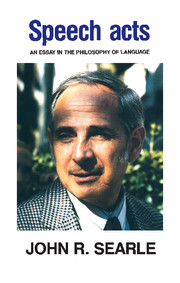4 - Reference as a speech act
Published online by Cambridge University Press: 05 June 2012
Summary
In this chapter and the next we shall delve inside the proposition to consider the propositional acts of reference and predication. Our discussion of reference will be confined to singular definite reference and will be to that extent an incomplete theory of reference. As we shall see that alone will provide us with plenty of problems, but until we get clear about them we are hardly likely to get clear about other kinds of reference.
The notion of singular definite reference is a very unsatisfactory one, but one we can hardly do without. The most obvious cases of referring expressions are proper names, but as soon as we consider other kinds of expressions such as singular definite descriptions we find that some of them are referring expressions, some obviously not, and some seem to fall in between. Furthermore, some occurrences of proper names are not referential, as in, e.g., “Cerberus does not exist”. Philosophers who discuss definite descriptions almost invariably fasten onto examples like “the king of France”, or “the man”, and seldom onto examples like “the weather”, “the way we live now”, or “the reason why I like beans”. This ought to arouse our suspicions. Consider for example the difficulty of applying Russell's theory of descriptions, without any paraphrases of the original, to a sentence like “The weather is good”: “(∃x) (x is a weather (y) (y is a weather → y = x) · x is good)” hardly makes any sense. Yet one is inclined to say the expression “the weather” performs a similar role in “The weather is good” to that of the expression “the man” in “The man is good”.
- Type
- Chapter
- Information
- Speech ActsAn Essay in the Philosophy of Language, pp. 72 - 96Publisher: Cambridge University PressPrint publication year: 1969
- 1
- Cited by



